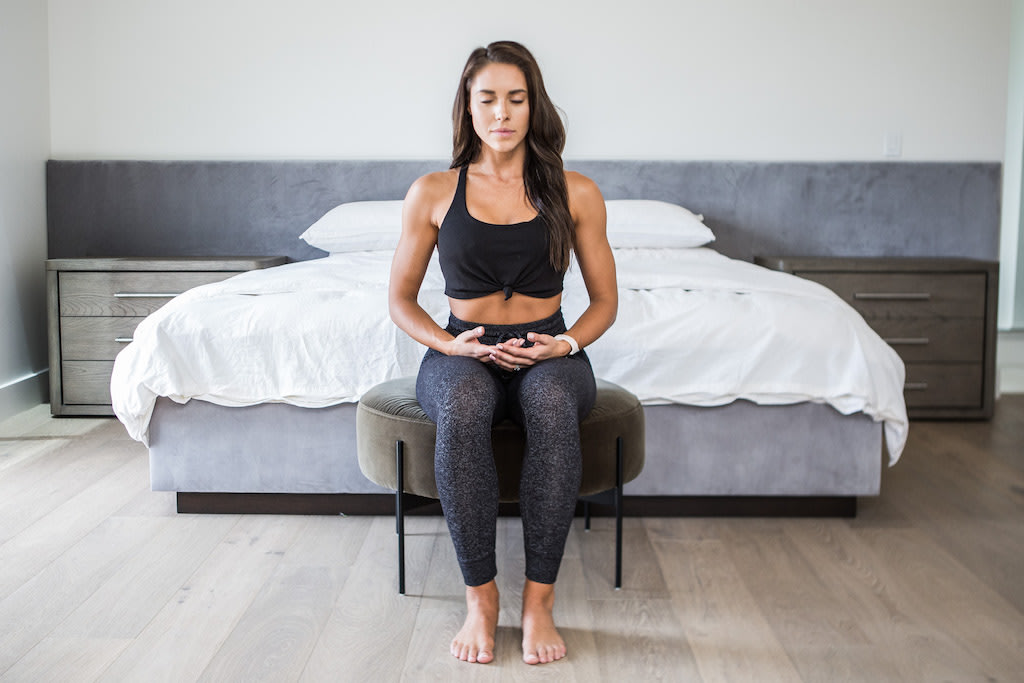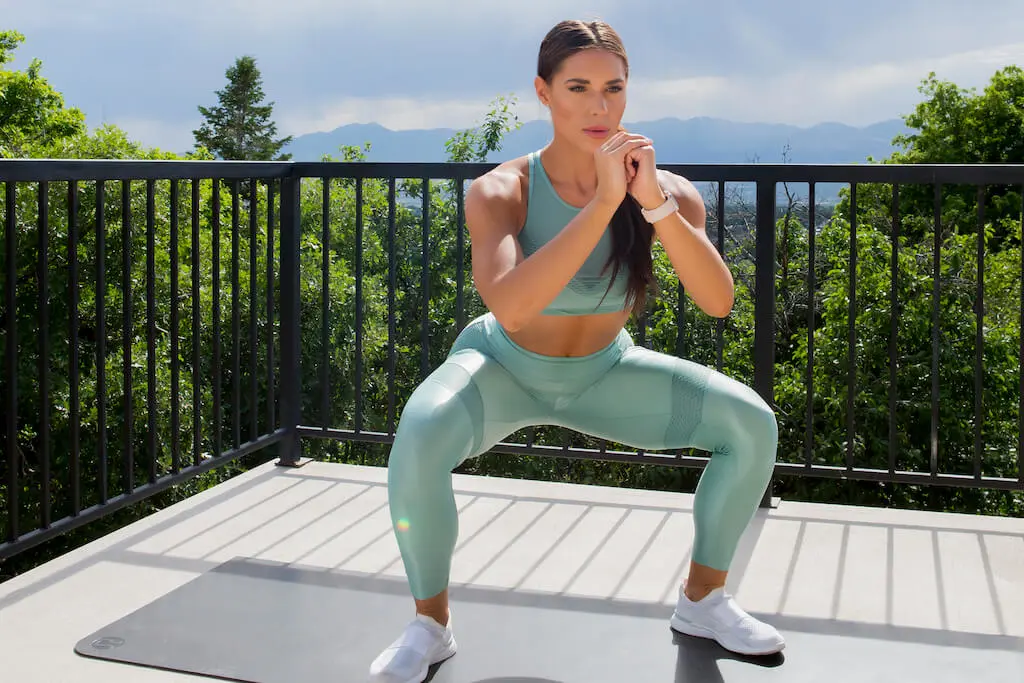15 Self-Care Tips To Prioritise Your Wellbeing

September 8, 2021 - Updated December 8, 2023

Self-care is often misunderstood as things you do to treat yourself - the bubble baths, massages and face masks. But self-care doesn’t need to be luxurious, indulgent or expensive. It’s self-explanatory, essential and a Sweat non-negotiable: taking care of yourself.
Whether you’re juggling a busy family schedule or staring at a diary of impending deadlines – or both! – it can be easy to let acts of self-care slip down your list of priorities, but it can make such a big difference to your overall health and wellbeing.
Creating a self-care practice will look different for everyone, as we all need to take care of ourselves in different ways. If you need some new ideas for me-time, keep reading for 15 simple wellness and self-care tips you can try right now.
What is self-care and why does it matter?
Like the oxygen mask analogy, self-care is about taking care of yourself first - physically, mentally, emotionally and spiritually. It’s all about helping you feel like the best version of yourself each day so you can show up better for yourself and your friends, family and colleagues.
Taking good care of yourself makes it easier to manage stress or any challenges that life throws your way, have energy, fight off illness, and have more capacity to care for others. And it doesn’t need to be complicated, either. Self-care can be simple.

15 self-care tips for looking after your wellbeing
During a single year, month or week, the self-care activities you need most at one time may vary significantly depending on what’s going on in your life and how you’re feeling. It can help to experiment and keep a list of self-care activities that fill each of your wellbeing cups - physical, mental, emotional and spiritual. Then at any point, you can pick and choose exactly what you need that will serve you best.
If you need some ideas to get started, here are 15 self-care tips designed to help you bump your wellbeing up the prioriity list, any day of the week.
Get a good night’s sleep
Getting enough quality sleep is important year-round, but especially when your health and wellbeing needs a little TLC. Sleep can boost your energy, mood, immunity, focus and workout recovery, too.
Best of all, sleep doesn’t cost a cent and works absolute wonders for your mind and body. If you’re having trouble sleeping, creating a consistent sleep routine can help you to nod off faster and stay asleep longer.
Spend more time outdoors
Whether you walk home from work, take your dog to the park, read in your yard, or exercise outdoors, there are so many ways to connect with nature during your daily routine.
Spending more time outside has a number of benefits, including getting your daily dose of Vitamin D (thanks sun!). A 2010 multi-study analysis also found that green exercise (activity in the presence of nature) has been found to improve self-esteem and mood, and another 2020 meta-analysis found that people who are more connected to nature tend to have greater eudaimonic wellbeing.
Move your body
In many ways, being active is one of the best self-care behaviours you can engage in.
The emotional, physical and mental benefits of exercise are immense. Alongside the physical benefits, the Mayo Clinic says moving your body on a regular basis can increase your energy levels, boost your mood and help manage stressful situations and anxiety — plus, it can work wonders for your self-confidence!
Be more mindful
You can practice mindfulness as part of your self-care routine by keeping a daily gratitude journal, trying breathwork techniques, taking a walk and focusing on the sights, sounds and smells around you, or even trying a meditation app to help improve your self-awareness and strengthen your mind.
If incorporating mindfulness into your workouts sounds like a bit of you, Kelsey Wells’ Redefine Fitness program in the Sweat app is an amazing place to start.

Make time for fun
Have you always wanted to try a dance class, loved drawing when you were younger, or are excited by the idea of being part of a social sports team? Consider making time for things you enjoy that feel like play rather than work and you’ll notice how much more balanced and uplifted you feel.
Find your flow with yoga
According to 2018 literature on the influence of yoga on the nervous system, yoga helps balance your sympathetic nervous system (often referred to as the fight or flight system) and parasympathetic nervous system (aka the rest and digest system). This highlights how a regular yoga practice can help to regulate the functions of the internal organs in your body while creating a greater sense of calm and wellbeing.
Some yoga styles are faster paced to challenge your balance and flexibility, while others such as Yin yoga are perfect for recovery, rest days or when your mind and body are craving something restorative.
Stay hydrated
The Harvard T.H. Chan School of Public Health recommends drinking plenty of water for a number of health reasons including to improve cognitive function, sleep quality and mood. Staying hydrated is also essential for the delivery of nutrients to your cells, good digestion, preventing infections and keeping your organs functioning well. Take this as your friendly reminder to grab a drink!
Speak to yourself kindly
You can be doing all the self-care in the world, but it’s not going to mean much if you’re your own harshest critic. Affirmations can be a powerful tool to help rewrite the script of how you speak to yourself, or if you’re a fan of gratitude journalling, try noting down what you’re proud of yourself for!
Try meditation
Meditation can offer a range of different cognitive, emotional and physical benefits, and even five minutes can shift how you feel. There are plenty of free guided meditations available online, or you can simply close your eyes and focus on your breathing.

Switch off
Whether you opt for screen-free days, don’t use devices in the bedroom or decide to unplug for a few hours, it’s always beneficial to take some time away from your screens so you can focus on your health, spend more time being active and prioritise activities that energise you. Taking a digital detox can also be a great way to hit the reset button, or you can make some mindful choices to cultivate a feel-good feed.
Nourish your body and brain
Good nutrition goes hand-in-hand with feeling like the best version of you, and it doesn’t need to be complicated. Focus on whole foods as much as you can, and keep it simple by aiming to:
Eat a rainbow of fruit and vegetables (with plenty of greens) to increase your nutrient intake
Include a good source of protein in each meal to encourage muscle recovery, growth and satiation. Protein-rich foods also tend to be high in vitamins and minerals!
Go for whole grain carbohydrates for a sustaining, slow-release of energy
Enjoy healthy fats to promote brain, skin and hormonal health
If nutrition is an area of focus for you, self-care could also look like setting aside time for meal-prepping, doing a weekly grocery shop, or aiming to cook more meals at home. Eating well can truly help you to feel better from the inside out!
Reach out and connect
Feeling happy and well within yourself is incredibly difficult when that sense of social connection and support is lacking, so remember that self-care doesn’t necessarily mean doing things by yourself.
Phone a friend or family member for a chat, ask the people within your household for some extra support at home, or even enlist a workout buddy to make movement a more joyful and social part of your day. If you’re feeling overwhelmed or not sure who to turn to, seeking out advice from a professional is another great way to take care of yourself.
Book those appointments
On the topic of letting others help, self-care can also mean taking care of yourself by making health and wellness appointments a priority. These may include things like:
A checkup with your GP
Breast mammogram
Skin check
Dentist checkup
Pap/smear test
Blood test
Hair cut
Physiotherapy or massage
Eye test
Set new goals
Life can quickly start to feel overwhelming and tiring if you’re focusing on goals that drain your energy. Take some time to assess your current direction and priorities, ask yourself if they are filling your cup, and be open to forging a new path forward if things aren’t working. Your goals and sense of direction could be related to health and fitness, but they also could be connected to your relationships, career, hobbies or finances!
Care for someone else
There are times when learning to say no and putting yourself first will be the best thing for your wellbeing, but in other moments, doing something for another person can send your happiness through the roof. According to the Mayo Clinic, kindness has been shown to increase self-esteem and mood, as well as having positive effects on your relationships, physical health and lifespan.
How to cultivate a self-care practice
Consistency is key when it comes to an effective self-care practice. Ideally, your self-care tools are things you come back to every week to promote a greater sense of wellbeing, rather than thinking of self-care as a toolbox you only open in emergencies. If making regular time for yourself is new to you, it can be helpful to start by brainstorming practices you could implement and a realistic routine that would fit into your lifestyle. You might even want to block out some time in your weekly schedule for self-care, just like you would with your workouts!
Everyone’s self-care practice looks different – how will yours look?
In the same way that everyone thrives on a slightly different approach to food and nutrition, self-care is very personal and sometimes needs a bit of trial and error to find what works best for you, and to know when you need it!
Take the time to listen to your body, prioritise activities that nourish your body and mind (complete rest counts here, too!), and be gentle with yourself when you need a little more care than usual.

A more empowered you starts with Sweat, and our editorial team is here to bring you the latest fitness tips, trainer recommendations, wellbeing news, nutritional advice, nourishing recipes and free workouts.
* Disclaimer: This blog post is not intended to replace the advice of a medical professional. The above information should not be used to diagnose, treat, or prevent any disease or medical condition. Please consult your doctor before making any changes to your diet, sleep methods, daily activity, or fitness routine. Sweat assumes no responsibility for any personal injury or damage sustained by any recommendations, opinions, or advice given in this article.
Wellbeing